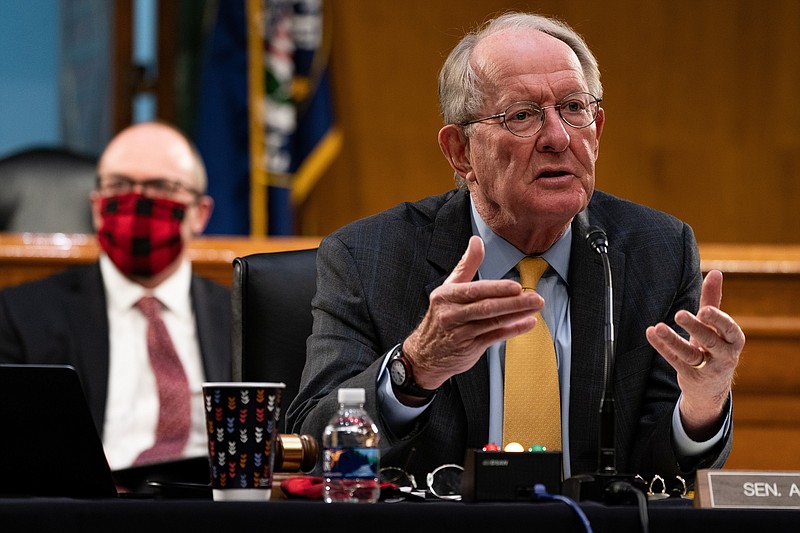"All roads back to work and back to school lead through testing," said Tennessee's Republican Sen. Lamar Alexander at the Senate Health, Education, Labor and Pensions Committee hearing he convened Thursday morning in Washington.
Alexander, as committee chairman, called the hearing, "Shark Tank: New Tests for COVID-19," and he called on Dr. Francis Collins of the National Institutes of Health and Dr. Gary Disbrow of the Biomedical Advanced Research and Development Authority to talk about their efforts - as leaders of this new "shark tank" - to create new technologies designed to produce tens of millions of COVID-19 tests.
Congressional hearings are always as much about grandstanding as they are about inquiry, and this one was no different. After all, Alexander cast the project that he and Missouri Republican Sen. Roy Blunt fathered in language that President Donald Trump and his supporters can understand: reality TV.
But the goal of encouraging a Shark Tank kind of competition is considerably loftier than just spectacle, and Alexander is to be commended for his push to use the capacities of government itself, in coordination with the private sector, to pull out all of the stops and create new technologies for producing tens of millions of diagnostic tests by August.
"There is no safe path forward to combat the novel coronavirus without adequate testing," Alexander wrote last month in a Washington Post opinion piece unveiling the plan.
To open the hearing Thursday, Alexander expanded on that theme.
"The end to this crisis will be determined by three things: tests, treatments, and vaccines," he said pointedly.
To learn more
Next Tuesday at 10 a.m., Alexander’s committee will hold another hearing, “COVID-19: Safely Getting Back to Work and Back to School,” to examine how the nation is dealing with this pandemic. Witnesses for that hearing will include NIH’s Dr. Anthony Fauci, CDC Director Robert Redfield, Assistant Secretary of Health Brett Giroir and FDA Commissioner Stephen Hahn. Watch it (and Thursday’s hearing) at https://www.help.senate.gov/hearings.
There is promising news that treatments and therapies will be available this summer, the senator added, noting "the administration's warp-speed pursuit" of a vaccine has a goal of 100 million doses by the fall and 300 million by January, a target much more ambitious than has ever been achieved before. Alexander also pointed to the private sector demonstrating a capacity to turn out quickly tens of millions of serology tests - antibody tests to determine whether people may have already had COVID-19 and developed immunity, at least for a time. The FDA this week is taking aggressive steps to make sure serology tests are accurate, he said.
"That is impressive - but not nearly enough," our senator added. "To test every nursing home, and every prison, everyone in an operating room, and some entire classes and campuses and factories, teams at sports events, and to give those tests more than once, we will need millions more tests. This demand will only grow as the country goes back to work and some 100,000 public schools and more than 5,000 colleges plan to reopen this August."
Alexander acknowledged that America has tested just over 7 million people - more than any other nation. But we must do better, he said.
Just as a reminder, there are 328.2 million people in the United States. Simple math tells us that means about three years before everyone could be tested with the 2 million to 2.5 million tests the U.S. is expected to be producing and using each week by mid-June.
And never mind the fact that ideally most of us should be tested more than once - since a test this week may not show the virus we caught last week or the one we might be exposed to three weeks from now.
Despite our 7 million tests to date, America is in the middle of the global pack when you look at testing on a per-capita basis. According to statista.com, the U.S. as of May 7 was in ninth place among developed countries, testing 24,186 people per million population.
Congress allocated special funding to the Biomedical Advanced Research and Development Authority, to work with NIH to accelerate production of these tests. Five days later the NIH announced the official start of its Shark Tank program. There were 400 requests for applications in the first 24 hours. And as of May 5, NIH had received 850 "expressions of interest" and 50 applications to review.
As Alexander and Collins noted, many of those concepts won't work, or won't be able to be scaled up quickly, and that's OK. Thomas Edison said he failed 10,000 times before he produced the first incandescent light bulb.
"Dr. Collins' shark tank is at least a mini-Manhattan project," Alexander said, noting that $2.5 billion does not go as far today as $2 billion did in 1942.
"It is likely that at this moment more scientists are working to create solutions to COVID-19 than on any other project in the world. Their success is the only way this will end, Alexander said. "Let us hope that out of Dr. Collins' shark tank will emerge at least one mighty great white shark that will help us combat this disease."
Indeed.
